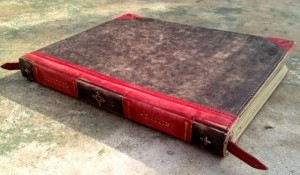 I am having such a busy month! This past weekend we moved my daughter to Richmond, a feat that took up lots of time and energy in the last week. We also saw the Richmond relatives for Father’s Day and my nephew had this for his iPad–it’s a cover that looks like a vintage book.
I am having such a busy month! This past weekend we moved my daughter to Richmond, a feat that took up lots of time and energy in the last week. We also saw the Richmond relatives for Father’s Day and my nephew had this for his iPad–it’s a cover that looks like a vintage book.
In search of something to talk about today, I went to Chambers Book of Days for today and found this entry– (it all seemed to fit….)
THE ROXBURGHE CLUB
This fraternity—the parent of the whole tribe of book-printing clubs which have occupied so broad a space in the literary system of our age—was formed on the 17thof June 1812. The plant shot forth from a hot-bed of bibliomania, which had been created by the sale of the Duke of Roxburghe’s library. On that occasion Earl Spencer, the youthful Duke of Devonshire, the Marquis of Blandford, and a whole host of minor men, lovers of old and rare books, were brought together in a state of high excitement, to contend with each other for the rarities exposed under the hammer of Mr. Evans, in the Duke of Roxburghe’s mansion in St. James’s Square. On the 16th of June, a number of them had chanced to dine together in the house of Mr. Bolland (afterwards Justice Bolland), on Adelphi Terrace. They had to look forward to the exposure on the ensuing day of a most rare and remarkable volume, a folio edition of Boccaccio, printed by Valdarfer of Venice in 1471. They agreed to meet again at dinner on the ensuing evening, at the St. Alban’s tavern, in order to talk over the fight which would by that time have taken place over the body of Valdarfer; and they did so.
 Earl Spencer, the unsuccessful candidate for the volume (which had sold at £2260), occupied the chair; Dr. Dibdin acted as croupier. There were sixteen other gentlemen present, all of them possessors of choice libraries, and all keen appreciators of scarce and curious books. The lively Dibdin tells us that they drank toasts which. were as hieroglyphical characters to the public, but’ all understood and cordially greeted by those who gave and those who received them.’ We may presume that the immortal memory of William Caxton was one of the most prominent; that sundry illustrious booksellers, and even notable binders (bibliopegists they called them), were not forgotten. The club was constituted by the persons there assembled; but by the time they had had two annual assemblages, the number was swelled to thirty-one, at which it was fixed.
Earl Spencer, the unsuccessful candidate for the volume (which had sold at £2260), occupied the chair; Dr. Dibdin acted as croupier. There were sixteen other gentlemen present, all of them possessors of choice libraries, and all keen appreciators of scarce and curious books. The lively Dibdin tells us that they drank toasts which. were as hieroglyphical characters to the public, but’ all understood and cordially greeted by those who gave and those who received them.’ We may presume that the immortal memory of William Caxton was one of the most prominent; that sundry illustrious booksellers, and even notable binders (bibliopegists they called them), were not forgotten. The club was constituted by the persons there assembled; but by the time they had had two annual assemblages, the number was swelled to thirty-one, at which it was fixed.
It was by an after thought that the club commenced its system of printing and reprinting, each member fixing upon some precious article, of which only as many copies were thrown off as afforded one to each, presented gratuitously. By this happy plan the friendly spirit of the brethren was of course promoted, at the same time that some valuable examples of ancient literature were rescued from oblivion. In the Scottish imitative societies—the Bannatyne Club, Maitland Club, &c.—the same plan was adopted; while in others of later institution the reprints have been effected by an equal annual subscription.
The Roxburghe Club still exists today and has produced a remarkable number of books over the years.
If you could have any antique book what would it be? Or do you own an antique book? (I own an 1815 edition of La Belle Assemblee!)

Amazing bit of history.
I don’t own any old books. I can’t. Old books trigger an allergic reaction in me. I do own a new copy of the original LOTR in a lovely leather bound edition.
I get itchy around certain old books, too, Laurel. Your solution to own a new but specially bound book is a good one.
That’s basically what the Roxburghe Club did. They chose old books in their possession and had them reprinted and specially bound for each club member.